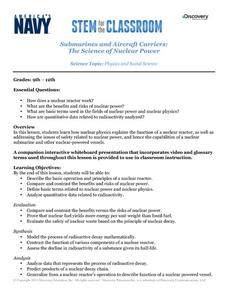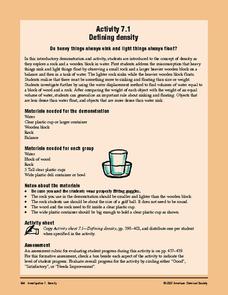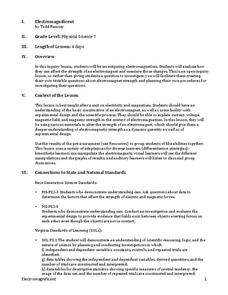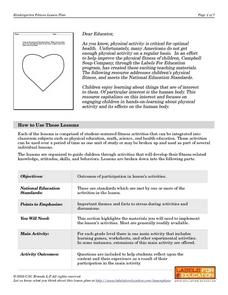Teach Engineering
Engineers Love Pizza, Too!
Help overcome challenges in eating pizza. Scholars work in groups to design a device that assists a physically handicapped person eat pizza. They build a prototype of such a device to test their designs before building. To...
Missouri Department of Elementary
Fatal Accident
While there may not be any ghostbusters in the neighborhood, there are plenty of emergency response agencies ready to give support if something is amiss. To that end, instructors invite a member of an emergency response agency to address...
Mr Gym
Clean House
Here is a game that can be played by any age level. Just make some small modifications appropriate for your grade level. The premise of the game is to have the fewest balls on your side when the whistle blows to end the game. So given...
Mr Gym
Hit and Switch
This activity sounds like a great warm-up or drill for your volleyball players. All the players start on one side of a line, once they bump the ball to another player, they cross the line and wait. The goal is to bump the ball to players...
Curated OER
Healthy Field Day
Hosting a Healthy Field Day will take a lot of planning and organization, but with a lot of parent participation it can come together very well. The resource describes seven stations of the ten that were presented. Each of these has a...
Curated OER
Food Pyramid Relay Race
Students explore healthy eating habits by conducting a physical food challenge. In this food pyramid lesson, students identify the main concepts behind the food pyramid and what choices they should be making with their food intake....
Mr Gym
Spider Web
Create a spider web between two poles and have your class get from one side of the web to the other without touching the web. There are four different suggested levels of play. The rules of each level guide how the players need to get...
Science Matters
Potential and Kinetic Energy
Everything has potential energy; learning to use it is the key to understanding all types of energy. Scholars learn the difference between kinetic and potential energy. They then apply the concept to drawing examples of both types...
PBS
Stories of Painkiller Addiction: The Cycle of Addiction
Drug addiction, including prescription drug addiction, begins with a reason that's different for every user. High schoolers learn more about the reasons people begin abusing drugs with a set of videos and worksheets that discuss four...
Discovery Education
Sonar & Echolocation
A well-designed, comprehensive, and attractive slide show supports direct instruction on how sonar and echolocation work. Contained within the slides are links to interactive websites and instructions for using apps on a mobile device to...
Discovery Education
Submarines and Aircraft Carriers: The Science of Nuclear Power
As physics masters view this presentation, they learn how nuclear power is used in submarines. They use Google Maps to plot a course through the ocean and calculate the time required for surfacing and traveling. They learn about fission,...
American Chemical Society
Defining Density
Three simple activities kick off a unit investigation of density. Your physical scientists make observations on the volume and mass of wood, water, and rocks, and make comparisons. Though this is written for grades three through eight,...
American Chemical Society
Mysterious M&M's
The first in a six-lesson mini unit, all using M&Ms® candies, this physical science activity gets kids to observe a single piece and discover what happens when it is placed in a plate of water. The activity can be used to...
Code.org
Sending Binary Messages
Pairs build a device that will be able to send a binary message. They then update their device to allow it to send four possible messages before upping the ante to eight. The provided self-assessment rubric comes with reflection...
Captain Planet Foundation
Sorting Out Soils
Sift through soil and learn about why it's important for organic processes. After discussing what makes up soil, such as the living organisms and what types of soil have more nutrients, kids sample layers of mulch and deeper soil to...
NOAA
Biological Oceanographic Investigations – Call to Arms
How many simple machines does it take to make a robotic arm? An inquiry-based lesson explores that topic and challenges pupils to build a robotic arm that can stretch, turn, and more. A few questions help guide them in the...
PBS
Stories of Painkiller Addiction: Learning About Opioids
Feeling high is not the only side effect of abusing prescription opioids. Middle and high schoolers learn more about specific painkillers, including Fentanyl, Oxycodone, and Clonazepam, as well as their common brand names and extensive...
Baylor College
Fuel for Living Things
During a three-part instructional activity, learners make a cabbage juice pH indicator and use it to analyze the waste products of yeast after feeding them with sugar. The intent is to demonstrate how living organisms produce carbon...
Baylor College
How Can We Find Out What Is in Water?
Using paper chromatography, water watchers discover that several substances might be dissolved even though they aren't visible. For this case, you will prepare a mixture of three different food colorings for them to experiment with. A...
STEM for Teachers
Electromagnificent
This physics pun really hertz, but this STEM lesson plan can help. The inquiry-based activity has young scientists create a testable question about electromagnetic strength; plan and implement their own experiments; and record and...
Agriculture in the Classroom
The Garden Chef
Introduce young chefs to nutritious eating with a cookbook that is divided into sections focusing on one of the five food groups. It includes lessons, activities, and recipes. How wholesome!
Texas State Energy Conservation Office
Nuts! Calculating Thermal Efficiency
Oh nuts! Do macadamias or almonds produce more thermal energy? Energy enthusiasts find out with this experiment. The objective is to demonstrate to your class how the chemical energy contained in foods can be converted into useable...
Curated OER
Change the Beat
Brainstorm the reasons why a healthy heart is important. Using a diagram, label and locate the heart and discuss its function. Practice finding your heartbeat and describe the effects of physical activity on the heart. Also perform an...
Wild BC
The Greenhouse Effect: The Role of CO2
Though this is meant to be second in a two-part instructional activity, the two are not dependent on each other. Pupils play the roles of visible light rays, light or dark surfaces, and carbon dioxide molecules. They interact and react...

























